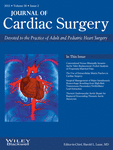Atorvastatin Regulates Apoptosis in Chronically Ischemic Myocardium
Abstract
Background
We previously demonstrated that atorvastatin upregulates proangiogenic proteins and increases arteriolar density in ischemic myocardium. Despite this, there was a lack of collateral-dependent perfusion, possibly related to apoptosis. We utilized a swine model of metabolic syndrome and chronic myocardial ischemia to investigate the effects of atorvastatin on apoptosis.
Materials and methods
Sixteen Ossabaw miniswine were fed a high-cholesterol diet for 14 weeks then underwent surgical placement of an ameroid constrictor to their circumflex artery inducing chronic ischemia. Eight pigs additionally received supplemental atorvastatin (1.5 mg/kg daily). Myocardium was harvested six months later for western blotting and TUNEL staining.
Results
Animals supplemented with atorvastatin had significant increases in markers associated with apoptosis including p-38, BAX, and caspase 3 (p < 0.05). Atorvastatin supplementation also resulted in significant increases in expression of cell survival proteins Bcl-2 and P-ERK and an overall decrease in apoptosis demonstrated by TUNEL staining (p < 0.05).
Conclusions
Atorvastatin acts on multiple pathways and its effects on angiogenesis remain unclear. Although there is increased expression in several markers of apoptosis, key anti-apoptotic proteins were also upregulated with an overall decrease in apoptosis. Further investigation of these pathways may provide insight into the role of statins on myocardial protection after ischemia. doi: 10.1111/jocs.12488 (J Card Surg 2015;30:218–223)




